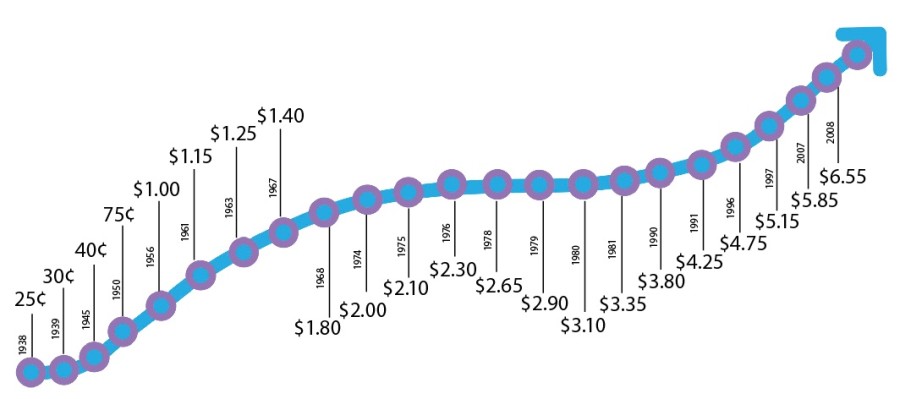Minimum wage increase signals growing trend
Potential widespread minimum wage increases may become reality in future for federal workers
The minimum wage may be up for an increase. This chart shows how the minimum wage has changed over time.
March 12, 2014
Earlier this month President Barack Obama used his executive power to raise hourly pay for federal contract workers from $7.25 to $10.10.
The Washington Post explained that around 2 million Americans are considered federal contract workers. Individuals who are considered federal contract workers may be janitorial staff members at a military base or construction workers building federal offices.
“I have heard that it’s not a very significant amount of workers and that most of them are already making more than minimum wage,” economics teacher Jack Hood said.
Thus, it may seem this executive act is inconsequential. Hood, however, believes the minimum wage increase is a step forward.
“It was a symbolic gesture,” Hood said. “It’s an example of a president leading with bully pulpit. It’s an example of him taking the lead on an issue… He’s hoping the states and Congress will follow his lead and raise the national minimum wage.”
Obama’s “gesture” has led to discussion about more general wage increases. The growing debate started at this year’s State of Union address, when Obama publicly backed proposed legislation that would increased the federal minimum wage from $7.25 to $10.10.
Several Fortune 500 companies like Gap, Inc., are already ahead of the federal government. The corporation has already announced plans to raise wages next year for all workers to $10.10 an hour.
Because many students at Lawrence High hold jobs, such an increase in hourly pay would be handedly supported.
Junior Kenzie Turner spends part of her weekends making minimum wage at Lucky Paws Bakery.
“I started working there because I need money to pay for gas and other expenses,” Turner said. “I think the minimum wage should be raised a little bit just because of the simple fact that it isn’t very much.”
Though Turner works to earn extra spending money, she noted some people work minimum wages to support entire families and would benefit from a pay increase.
“You would definitely have to work a lot,” Turner said. “It would be hard to support a family on minimum wage.”
Junior Jacob DiVilbiss, employed by HyVee, likewise supports a minimum wage increase.
“I think a federal minimum wage increase would be good in terms of cash flow for people earning minimum wage,” DiVilbiss said.
He supports such an action even though he actually earns 25 cents more per hour than the legal minimum wage.
For him, however, the money makes little financial difference, but instead speaks to the employer-employee relationship.
“I don’t think the extra quarter makes that much difference. I get $10 extra on my paycheck,” DiVilbiss said. “The difference it does make is that it shows my employers have respect for me and for new hirees. It shows they don’t just want us for our labor, but because they have respect for us.”
Raising the minimum wage may make it more difficult for employers to include this show of good faith and respect on their workers’ paychecks.
“Certainly if you raise the cost operation for a business, you are going to lose workers,” Hood said. “Workers are either going to be working fewer hours, or they will be fired. There will be some attrition, some unemployment.”
In addition to increased unemployment, inflation represents a possible externality tied to federal minimum wage increases as it could serve to devalue the dollar.
“Inflation is another effect,” Hood said. “If there’s more money in circulation, more money being spent, you’re going to see prices increase.”
Hood also noted economists have begun to argue about the repercussions of wage increases. While some would cite sure unemployment and inflation, other think increased waged would stimulate spending.
“I think it’s probably time to raise the minimum wage, but how much is up for debate,” Hood said.














